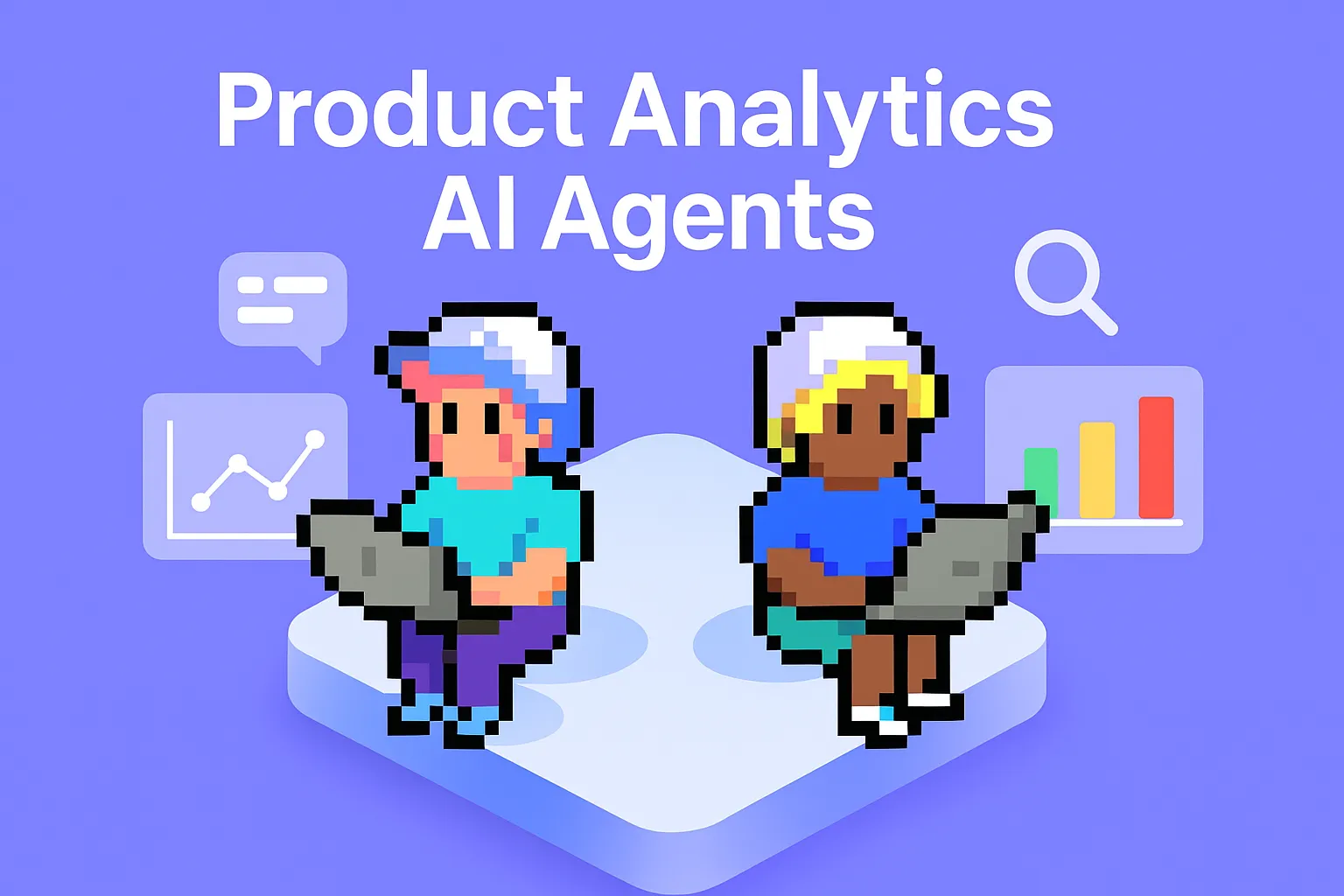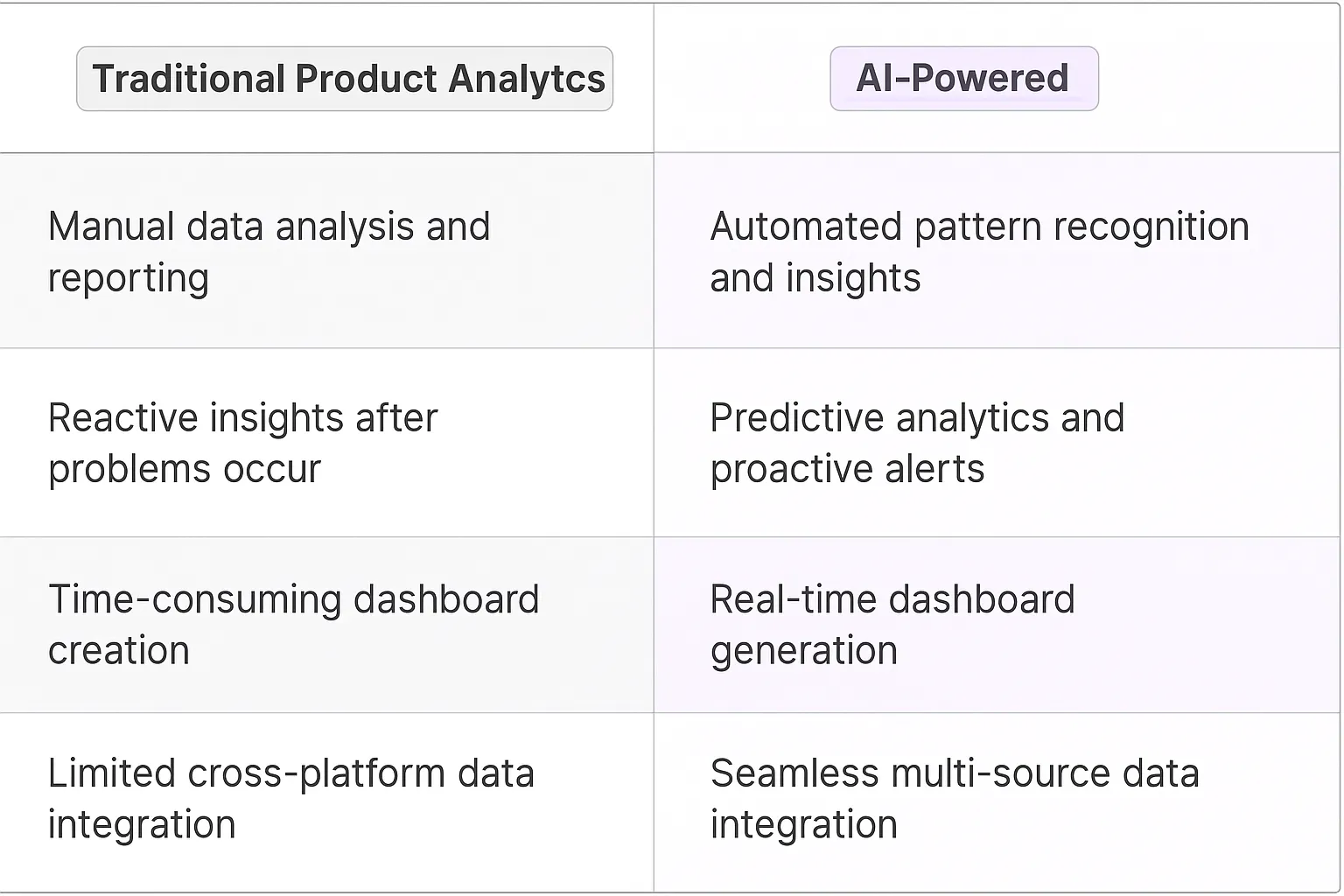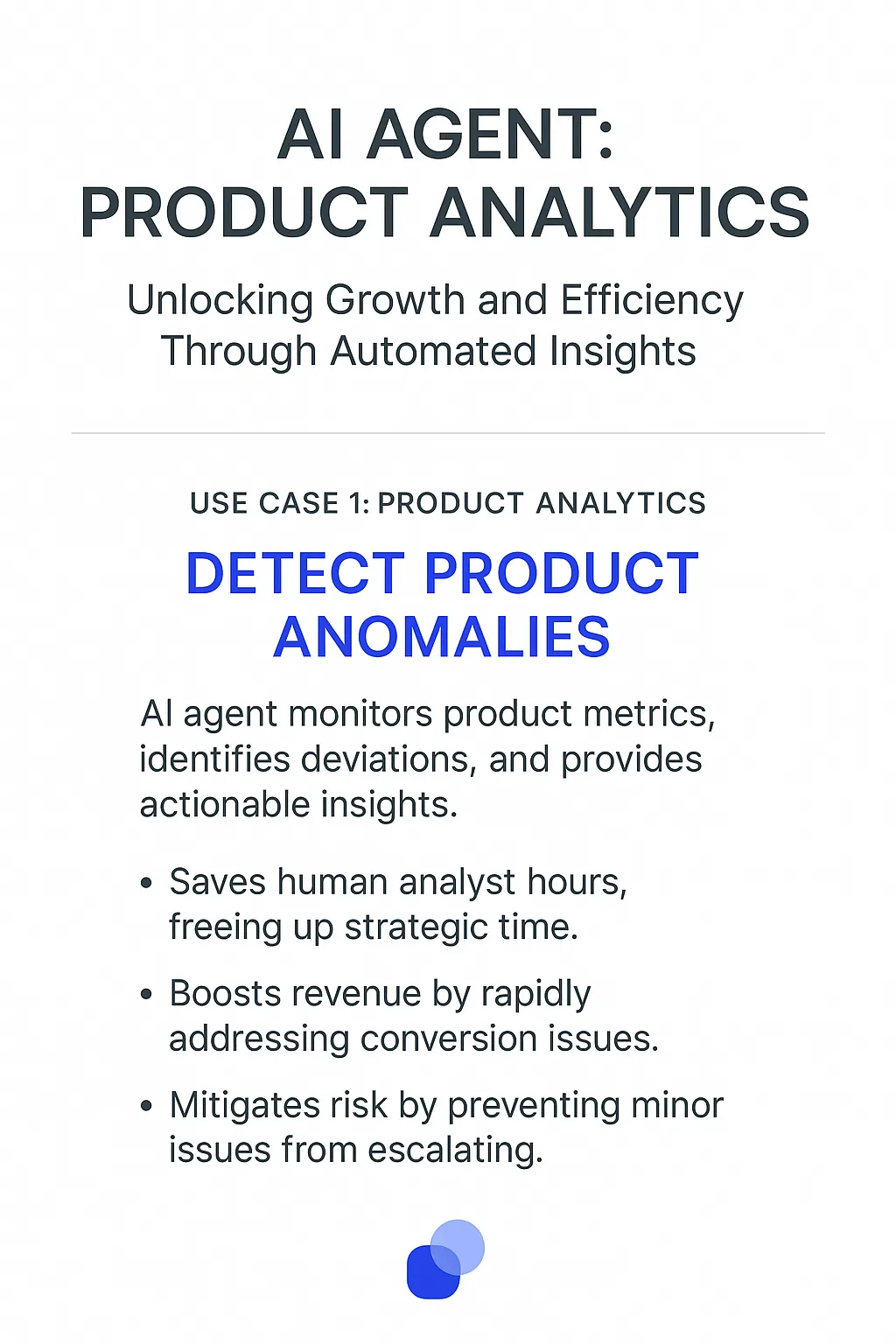Product Analytics AI Agents
Understanding Product Analytics and AI Agents
What is Product Analytics?
Product Analytics is the art and science of using data to understand how users interact with a digital product. It's about diving deep into user behavior, engagement patterns, and conversion funnels to extract insights that drive product improvements. Think of it as a powerful lens that brings your users' needs and pain points into sharp focus, allowing you to craft experiences that truly resonate.
Key Features of Product Analytics
Product Analytics typically encompasses several core features:1. User Segmentation: Slicing and dicing your user base to understand different behavior patterns.2. Funnel Analysis: Tracking user journeys through critical paths in your product.3. Cohort Analysis: Comparing how different groups of users behave over time.4. Retention Metrics: Measuring how well you're keeping users engaged long-term.5. Event Tracking: Capturing specific actions users take within your product.6. A/B Testing: Experimenting with different product versions to optimize performance.When you combine these features with AI, you get a supercharged analytics engine that doesn't just crunch numbers, but generates insights and predicts outcomes at scale.

Benefits of AI Agents for Product Analytics
What would have been used before AI Agents?
Before AI agents entered the product analytics scene, teams relied on a hodgepodge of tools and manual processes. You'd have data analysts poring over spreadsheets, product managers juggling multiple dashboards, and engineers writing custom queries. It was like trying to piece together a 1000-piece puzzle while blindfolded – possible, but painfully slow and error-prone.
Companies would typically use a mix of Google Analytics, Mixpanel, or Amplitude, combined with their own data warehouses and BI tools. The process was fragmented, time-consuming, and often resulted in analysis paralysis. Teams struggled to extract actionable insights from the sea of data, leading to missed opportunities and slower product iterations.
What are the benefits of AI Agents?
Enter AI agents for product analytics – they're like having a team of data scientists, product strategists, and growth hackers rolled into one, working 24/7. These digital teammates are transforming how we approach product analytics in several key ways:
- Predictive Insights: AI agents don't just tell you what happened; they forecast what's likely to happen. They can predict user churn, identify features that are likely to drive engagement, and even suggest optimal pricing strategies based on usage patterns.
- Automated Anomaly Detection: Instead of manually sifting through data to spot irregularities, AI agents continuously monitor your metrics and alert you to significant deviations. This means you can catch and address issues before they become major problems.
- Personalized User Segmentation: AI agents can identify nuanced user segments that humans might miss. They can cluster users based on behavior patterns, preferences, and engagement levels, allowing for hyper-targeted product improvements and marketing efforts.
- Natural Language Querying: Forget complex SQL queries. With AI agents, anyone on the team can ask questions in plain English and get instant, data-driven answers. It's like having a product analytics expert on speed dial.
- Contextual Recommendations: AI agents don't just present data; they interpret it and offer actionable recommendations. They might suggest A/B tests, feature modifications, or user flow optimizations based on the analyzed data.
- Cross-platform Data Integration: AI agents can seamlessly integrate data from multiple sources, providing a holistic view of your product's performance across various platforms and touchpoints.
- Continuous Learning: As these AI agents interact with your data and team, they become smarter over time. They learn your product's nuances, your team's priorities, and your market's dynamics, making their insights increasingly valuable.
The real game-changer here is speed and scale. AI agents can process and analyze data at a pace and volume that would be impossible for human teams. This allows for real-time decision making and rapid product iterations. It's not about replacing human intuition, but rather augmenting it with data-driven insights at unprecedented speed and scale.
In the fast-moving world of product development, AI agents for analytics are becoming as essential as version control is for engineering. They're not just tools; they're catalysts for product-led growth, enabling teams to build better products faster and more efficiently than ever before.

Potential Use Cases of AI Agents with Product Analytics
Processes
Product analytics is a game-changer, but let's face it - it's often a time sink. Enter AI agents, the unsung heroes ready to transform how we dissect user behavior and product performance. These digital teammates aren't just number crunchers; they're your round-the-clock product insight generators.
Consider the continuous loop of data collection, analysis, and insight generation. AI agents can automate this entire cycle, freeing up your team to focus on strategic decisions rather than drowning in spreadsheets. They can monitor key metrics in real-time, flag anomalies, and even suggest potential causes for sudden changes in user behavior.
But here's where it gets really interesting: AI agents can go beyond reactive analysis. They can proactively identify emerging trends, predict future user behaviors, and even simulate the impact of potential product changes before you roll them out. It's like having a crystal ball for your product roadmap, powered by data and machine learning.
Tasks
Let's break this down into some concrete tasks where AI agents can make a real difference:
- Cohort Analysis on Steroids: AI agents can automatically segment users into meaningful cohorts based on behavior patterns, not just predefined attributes. They can then track these cohorts over time, identifying which groups are driving growth or churn.
- Funnel Optimization: Instead of manually analyzing conversion funnels, AI agents can continuously monitor each step, identify bottlenecks, and even suggest A/B tests to improve conversion rates.
- Feature Impact Assessment: When you launch a new feature, AI agents can automatically track its usage, correlate it with key metrics like retention and engagement, and provide a comprehensive impact report.
- Predictive Churn Analysis: By analyzing historical data and current user behavior, AI agents can flag users at risk of churning before they actually do, allowing for timely intervention.
- Personalized Insights: AI agents can tailor analytics dashboards and reports for different team members based on their roles and priorities, ensuring everyone gets the most relevant insights.
The beauty of AI agents in product analytics is that they're not just doing the heavy lifting - they're augmenting human creativity and strategic thinking. They're not replacing product managers or data analysts; they're empowering them to make better decisions, faster.
As we move into this AI-powered era of product development, the companies that can effectively leverage these digital teammates will have a significant edge. They'll be able to iterate faster, understand their users more deeply, and ultimately build products that truly resonate with their target market.
The future of product analytics isn't just about having more data - it's about having AI agents that can turn that data into actionable insights at the speed of thought. And that future is already here.

Industry Use Cases: Product Analytics AI Agents
Product analytics AI agents are reshaping how businesses understand and optimize their digital offerings. These digital teammates aren't just crunching numbers; they're uncovering hidden patterns and delivering actionable insights that can make or break a product's success. Let's dive into some meaty, industry-specific examples that show how these AI agents are transforming workflows and decision-making processes.
From e-commerce giants fine-tuning their recommendation engines to SaaS startups decoding user behavior, product analytics AI agents are becoming indispensable. They're not just tools; they're strategic partners that can spot trends before they become obvious, predict user churn with eerie accuracy, and suggest feature improvements that actually move the needle.
But here's the kicker: these AI agents aren't replacing human intuition and creativity. Instead, they're amplifying our capabilities, allowing product teams to focus on high-level strategy while the AI handles the heavy lifting of data analysis. It's like having a brilliant data scientist working 24/7, but without the need for sleep or coffee breaks.
In the following examples, we'll explore how different industries are leveraging these AI agents to gain a competitive edge, improve user experiences, and drive growth. These aren't just hypothetical scenarios; they're real-world applications that are changing the game right now.
E-commerce: Unlocking Hidden Patterns with Product Analytics AI
The e-commerce landscape is a goldmine of data, but most companies barely scratch the surface. Enter Product Analytics AI agents – the digital teammates that can transform how online retailers understand and optimize their product offerings.
Take a high-growth D2C fashion brand like Everlane or Allbirds. They're drowning in data: clickthrough rates, add-to-cart events, purchase histories, return rates, and more. Traditional analytics tools give you the "what" but often miss the "why" behind user behavior.
A Product Analytics AI agent can dive deep into this data ocean, surfacing insights humans might miss. It could identify that customers who view product videos are 3x more likely to purchase and 50% less likely to return items. Or it might uncover a counterintuitive trend: shoppers who spend more time reading reviews actually convert at a lower rate, suggesting that your review system might be creating doubt rather than confidence.
The real magic happens when the AI starts connecting dots across your entire product ecosystem. It might notice that customers who purchase sustainable sneakers are also highly likely to engage with your recycling program, opening up new opportunities for cross-promotion and community building.
But here's where it gets really interesting: these AI agents don't just analyze – they can act. Imagine an AI that not only identifies a sudden spike in interest for a particular color or style but also automatically adjusts inventory forecasts, tweaks marketing spend, and even suggests product design modifications for the next season.
The end result? A hyper-responsive e-commerce operation that's always one step ahead of consumer trends, maximizing sell-through rates and minimizing waste. It's not just about selling more stuff – it's about building a smarter, more sustainable business model that's tuned into the pulse of your customer segmentation base.
In the cutthroat world of online retail, this level of AI-powered insight isn't just a nice-to-have – it's quickly becoming table stakes for anyone serious about winning the e-commerce game.
Gaming: Leveling Up Player Engagement with Product Analytics AI
The gaming industry is a perfect petri dish for Product Analytics AI. It's a space where user behavior is everything, and the tiniest tweaks can mean the difference between a hit and a flop.
Let's zoom in on a mid-sized mobile game studio. They've got a portfolio of free-to-play titles, each generating terabytes of data daily. We're talking session lengths, in-app purchases, progression rates, churn predictors – the works. But here's the kicker: most studios are barely scratching the surface of what this data can tell them.
Enter a Product Analytics AI agent. This isn't your grandma's dashboard – it's a digital teammate that's constantly mining your data for gold. It might notice that players who complete the tutorial in under 3 minutes are 5x more likely to make a purchase in the first week. Or it could flag that users who join a guild within their first three sessions have a 70% lower churn prediction rate.
But here's where it gets spicy: the AI doesn't just spot these patterns – it acts on them. Imagine an AI that dynamically adjusts difficulty curves based on individual player skill levels. Or one that personalizes in-game offers based on a player's behavior, not just their spending history.
The real game-changer? When the AI starts connecting dots across your entire game ecosystem. It might discover that players who max out one character type in your RPG are highly likely to churn unless they're introduced to a complementary character within 48 hours. Boom – you've just unlocked a retention hack that no human analyst would have spotted.
And we're not just talking about tweaking existing games. This AI becomes your secret weapon in the ideation phase. It could analyze trends across your portfolio and the broader market, helping you identify untapped niches or innovative mechanics that are likely to resonate with your player base.
The end result? A gaming studio that's not just reactive, but predictive. You're not just making games – you're crafting experiences that adapt in real-time to player behavior, maximizing user engagement, monetization, and ultimately, fun.
In the hyper-competitive world of gaming, where user acquisition costs are skyrocketing and attention spans are shrinking, this level of AI-powered insight isn't a luxury – it's survival. The studios that harness the full power of their data won't just survive the game – they'll change how it's played.
Considerations
Technical Challenges
Implementing a Product Analytics AI Agent isn't just about slapping some machine learning on your data and calling it a day. It's a complex beast that requires careful consideration and planning.
First off, data quality is paramount. Your AI is only as good as the data it's fed. If you're pumping in garbage, you're going to get garbage insights out. This means setting up robust data collection processes, cleaning your data meticulously, and ensuring consistency across all your data sources.
Then there's the challenge of feature engineering. You need to transform your raw data into meaningful features that your AI can actually learn from. This isn't just a technical task - it requires deep domain knowledge and creativity. You're essentially teaching your AI what to look for in your product data.
Model selection and tuning is another hurdle. There's no one-size-fits-all solution here. You'll need to experiment with different algorithms and architectures to find what works best for your specific use case. And once you've chosen a model, you're in for a long process of tweaking and fine-tuning to optimize its performance.
Operational Challenges
On the operational side, integrating an AI Agent into your existing product analytics workflow is no walk in the park. You're essentially asking your team to adopt a new team member - one that speaks in probabilities and confidence intervals rather than clear-cut answers.
This leads to the challenge of interpretability. Your AI might come up with brilliant insights, but if your team can't understand or trust them, they're useless. You need to find ways to make your AI's decision-making process transparent and explainable.
There's also the issue of model drift. Your product and your users are constantly evolving, and your AI needs to keep up. This means setting up systems for continuous monitoring and retraining of your models.
Finally, don't underestimate the cultural shift required. Implementing an AI Agent isn't just a technical change - it's a fundamental shift in how your team approaches product analytics. You'll need to invest in training and change management to ensure your team is ready to work alongside their new digital teammate.
Remember, implementing a Product Analytics AI Agent is a journey, not a destination. It requires ongoing commitment, resources, and a willingness to learn and adapt. But get it right, and you'll have a powerful ally in your quest to build better products.
Embracing the Future of Product Development with AI Agents
Product Analytics AI Agents are more than just a trend - they're a paradigm shift in how we approach product development and optimization. By automating complex analyses, uncovering hidden patterns, and delivering predictive insights, these digital teammates are enabling product teams to move faster and make more informed decisions than ever before.But the real power of these AI agents lies in their ability to augment human creativity and intuition. They're not replacing product managers or data analysts; they're empowering them to focus on high-level strategy and innovation while the AI handles the heavy lifting of data analysis.As we move forward, the companies that can effectively leverage these AI agents will have a significant competitive advantage. They'll be able to iterate faster, understand their users more deeply, and ultimately build products that truly resonate with their target market.The future of product analytics isn't just about having more data - it's about having AI agents that can turn that data into actionable insights at the speed of thought. And for businesses ready to embrace this new paradigm, the possibilities are endless.













